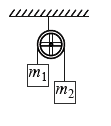Two masses m1 and m2(m1>m2) are falling from the same height when same air resistance acts on them
m1 has more acceleration
m1 reaches the ground early
m1 has more velocity on striking the ground
All the above
The correct Answer is:D
Topper's Solved these Questions
- LAWS OF MOTIONBOOK - AAKASH SERIESCHAPTER - LAWS OF MOTIONEXERCISE - EXERCISE - II
117 Videos
- LAWS OF MOTIONBOOK - AAKASH SERIESCHAPTER - LAWS OF MOTIONEXERCISE - PRACTICE EXERCISE
98 Videos
- LAWS OF MOTIONBOOK - AAKASH SERIESCHAPTER - LAWS OF MOTIONEXERCISE - Application
6 Videos
- GEOMETRICAL OPTICSBOOK - AAKASH SERIESCHAPTER - GEOMETRICAL OPTICSEXERCISE - ADDITIONAL PRACTICE EXERCISE (LEVEL-II PRACTICE SHEET (ADVANCED) INTEGER TYPE QUESTIONS)
6 Videos
- LOGIC GATESBOOK - AAKASH SERIESCHAPTER - LOGIC GATESEXERCISE - Exercise (Very Short Answer)
16 Videos
Similar Questions
Assertion: Two bodies of masses M and m(M>m) are allowed to fall from the same height if the air resistance for each be the same then both the bodies will reach the earth simultaneously.
Reason: For same air resistance, acceleration of both the bodies will be same.
View SolutionTwo particles of masses m1 and m2 (m1>m2) are separated by a distance d. The shift in the centre of mass when the two particles are interchanged.
View Solution
Knowledge Check
Assertion: Two bodies of masses M and m(M>m) are allowed to fall from the same height if the air resistance for each be the same then both the bodies will reach the earth simultaneously.
Reason: For same air resistance, acceleration of both the bodies will be same.AIf both assertion and reason are true and reason is the correct explanation of assertion.BIf both assertion and reason are true but reason is not the correct explanation of assertion.CIf assertion is true but reason is false.DIf both assertion and reason are false.Assertion: Two bodies of masses M and m(M>m) are allowed to fall from the same height if the air resistance for each be the same then both the bodies will reach the earth simultaneously.
Reason: For same air resistance, acceleration of both the bodies will be same.AStatement-1 is True , Statement-2 is True, Statement-2 is a correct explanation for Statement-1.BStatement-1 is True , Statement-2 is True, Statement-2 is NOT a correct explanation for Statement-1.CStatement-1 is True, Statement-2 is FalseDStatement-1 is False, Statement-2 is True.A smooth massless string passes over a smooth fixed pulley. Two masses m1 and m2(m1>m2) are tied at the two ends of the string. The masses are allowed to move under gravity starting from rest. The total external force acting on the two masses is
A(m1+m2)gB(m1−m2)2m1+m2gC(m1−m2)gD(m1+m2)2m1−m2g
Two masses m1 and m2(m2>m1) are hanging vertically over frictionless pulley. The acceleration of the two masses is :

View SolutionTwo masses m1 and m2(m2>m1) are hanging vertically over frictionless pulley. The acceleration of the two masses is :

View SolutionTwo masses m1 and m2(m2>m1) are hanging vertically over frictionless pulley. The acceleration of the two masses is :

View SolutionTwo bodies of masses M and m are allowed to fall from the same height . If air resistance for each body be same , will the two bodies reach the ground simultaneously ?
View SolutionTwo small balls of the same size and of mass m1 and m2(m1>m2) are tied by a thin light thread and dropped from a large height. Determine the tension T of the thread during the flight after the motion of the balls has become steady. (Air resistance force is same on two balls)
[Take m1=2kg, m2=1kg, g=10m/s2]
View Solution
